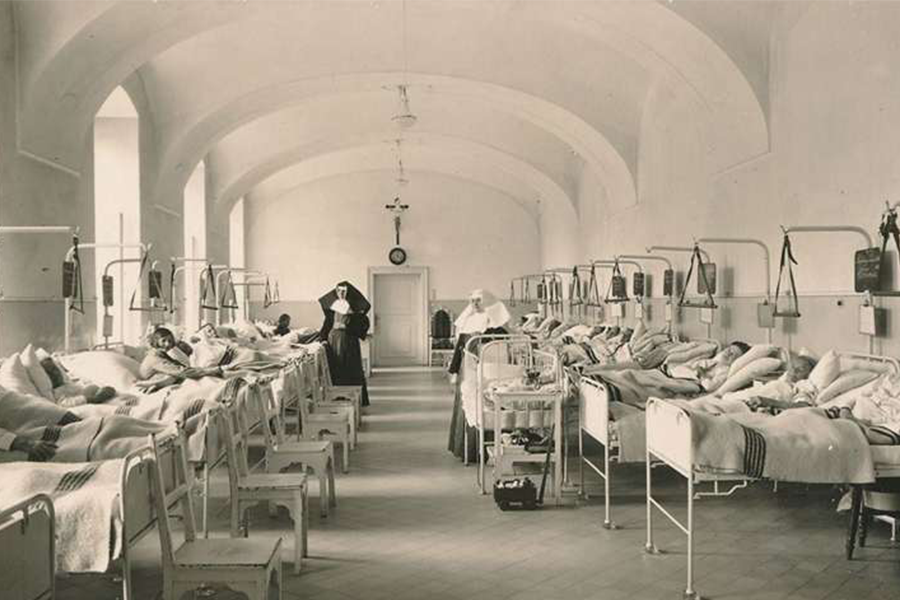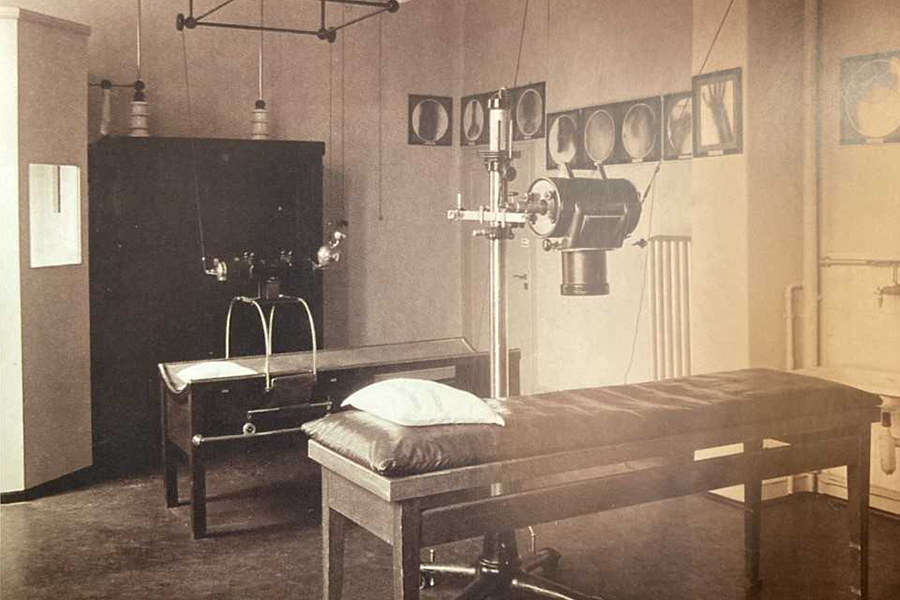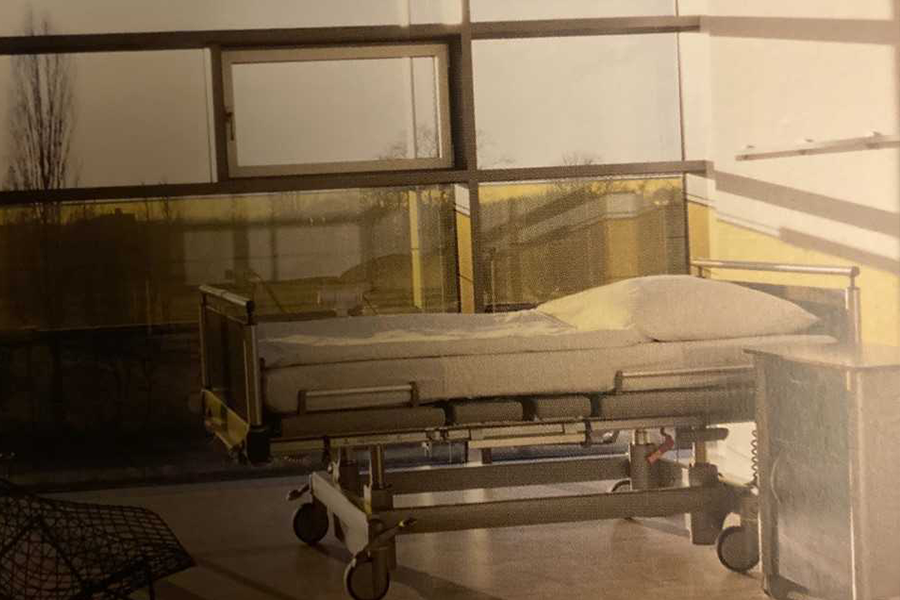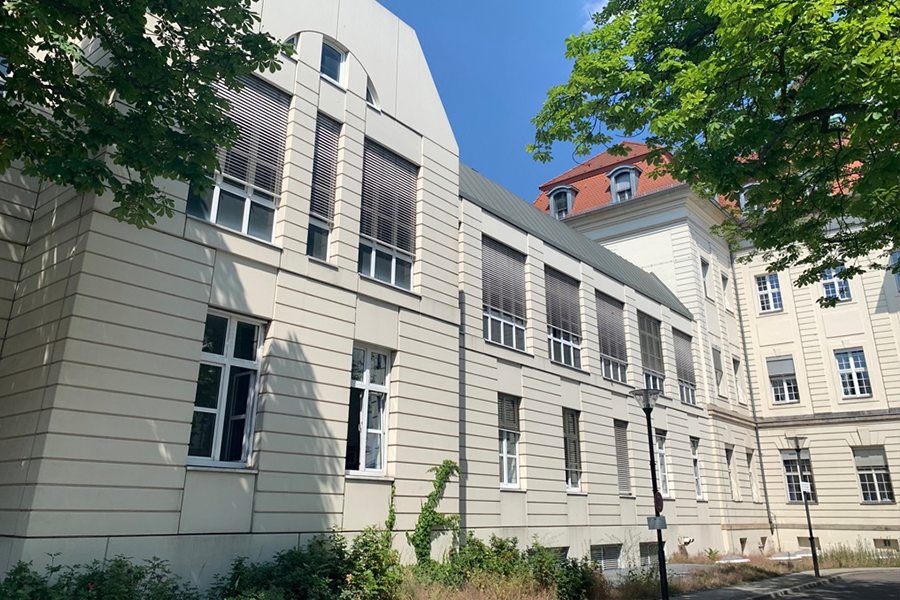Selected Research Foci
The 'hospital discharge letter' through the lens of cultural studies: on the narrativity, history and ethics of an unknown genre of medical communication
NSF interdisciplinary project, no. 10.003.969, duration 8/2025 - 7/2029
Prof. Dr. Dr. Martina King (Fribourg)
Prof. Dr. Dr. Ralf Jox (Lausanne)
Prof. Dr. Dr. Felix Rietmann (Lausanne)
We gradually began a swift reduction of the sedation. The rhabdomyolysis regimen was stopped in the course of the treatment. The calculated antibiotic treatment was terminated quickly as infection parameters decreased. The planned weaning from sedation proved challenging.
- Martina King / Tom Kindt (Eds.): Narrative structure and narrative knowing in medicine and science, in: Narratologia. Contributions to Narrative Theory, Berlin 2023
- Martina King: «Es liegt eine aktive Blutung vor»: storytelling in the genre ‚discharge report‘ in: Kulturpoetik 2021/1, S.70-93
- Martina King: «Nach Aufnahme arterielle Hypotonie»: concept of personhood and form of communication in expert medicine, in: Gesnerus, Vol. 77/2 (2020), S. 411-437
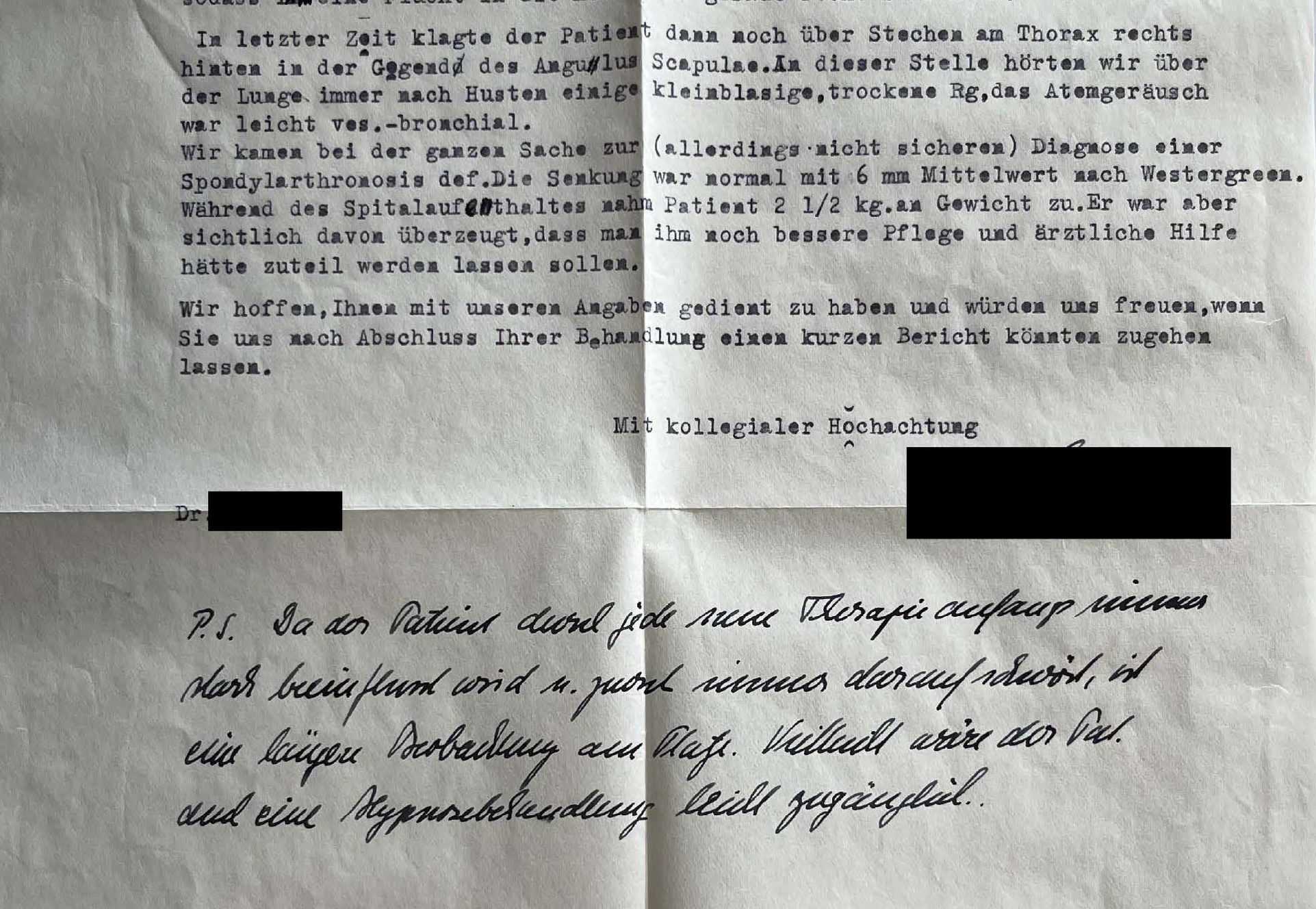
Medical Spaces in Literary Prose in the long 20th Century
(SNF Project Nr. 50070101, 5/2023 – 5/2027)
Team:
Prof. Dr. phil. Dr. med. Martina King (PI)
Prof. Dr. phil. Benjamin Specht (senior researcher)
Dr. med. cand. phil. Mona Baie (PhD student, comparative literature)
PD Dr. phil. Matthias Aumüller (associated consulting researcher)
PD Dr. phil. Katrin Dennerlein (associated consulting researcher)
Anna-Marie Joos (research assistant, comparative literature)
How does modern literature narrate medical spaces and what functions do they have in a broader socio-cultural context? This is the central question of our project which employs an interdisciplinary approach anchored in historical narratology and spatial studies.
Our question is asked against the backdrop of the rapid evolution of the medical system during the 20. and 21th centuries, which has brought about numerous new technologies, diagnostic tools and therapies – as well as parallel, specialized ‘spaces of progress’. Initially, these were pathological institutes, laboratories, X-ray-rooms, later on followed intensive care wards, large hospitals, clinical centers and radiation rooms.
In these ‘closed spaces’, man is now measured, quantified and optimized, the process of medicalization is irreversible.
Literature seems to take an especially great interest in such exotic settings. Crucially, it displays them more as disturbing and unstable settings of existential human experience, rather than as spaces of reliable knowledge or scientific progress, as one might expect. If the reader, for example, allows him/herself to be led through the disconcerting autopsy rooms of Schnitzler’s Dream Novella (1925) or tries to orientate him/herself in the chaotic x-ray chamber of Thomas Mann’s Der Zauberberg (1924), he/she will feel uncertainty and disorientation, rather than a growing trust in infallibility of scientific progress; a glimpse of crisis instead of epistemic stability. The first aim of the project (monograph I, PI) is consequently to reconstruct medical spaces as ‘settings of crisis’ in fictional prose of the early 20th century.
After 1945, literature seems equally engaged with medical spaces, but now with a perspective which has shifted from the acting expert to the affected patient. In this period, there is an evergrowing international publishing market for ‘illness narratives’; autobiographical texts that display sickrooms, waiting rooms, corridors or clinics, seen from the perspective of the sick as spaces of suffering, surmounting, overcoming or transcending – think e.g. of Thomas Bernhard and Christa Wolf, Audre Lorde and Hilary Mantel, Wolfgang Herrndorf, David Wagner and Ruth Schweikert. Given this context, the second aim of the project (monograph II, PhD) is to explore the idea of crisis in contemporary autopathobiographical prose.
Our overarching thesis can be summarised as follows: literature does not only play a general and important role in the process of medicalization. In fact, it also participates specifically with an autonomous voice in the shaping and framing of medical spaces, providing polysemic settings of human experience that are loaden with symbolical and allegorical meaning
-
Persuasion and prevention. Between promotion and resistance to smallpox vaccination at the beginning of the 19th century in French-speaking Switzerland (Lovey)
The research project focuses on the social and political history of childhood smallpox vaccination in French-speaking Switzerland (Fribourg, Vaud and Neuchâtel) at the beginning of the 19th century (end of the 18th century – 1848). As the first public health policies were being drawn up, the newly discovered smallpox vaccine, which had spread throughout Europe, attracted the attention of the political and medical authorities, the medical profession and the family itself. Children, the main victims of the disease, were at the centre of various converging or diverging interests. By examining the coercive or incentive approach of the vaccination campaigns, the control of the practice and its acceptance by the population, this research aims to understand when, how and why children health became a social and political issue. The comparison of the cantons of Fribourg and Vaud, as well as the Principality of Neuchâtel, allows us to highlight the strategies and constraints of the different socio-economic and political realities of the three regions: rural/urban, Catholic/reformist, conservative/liberal.
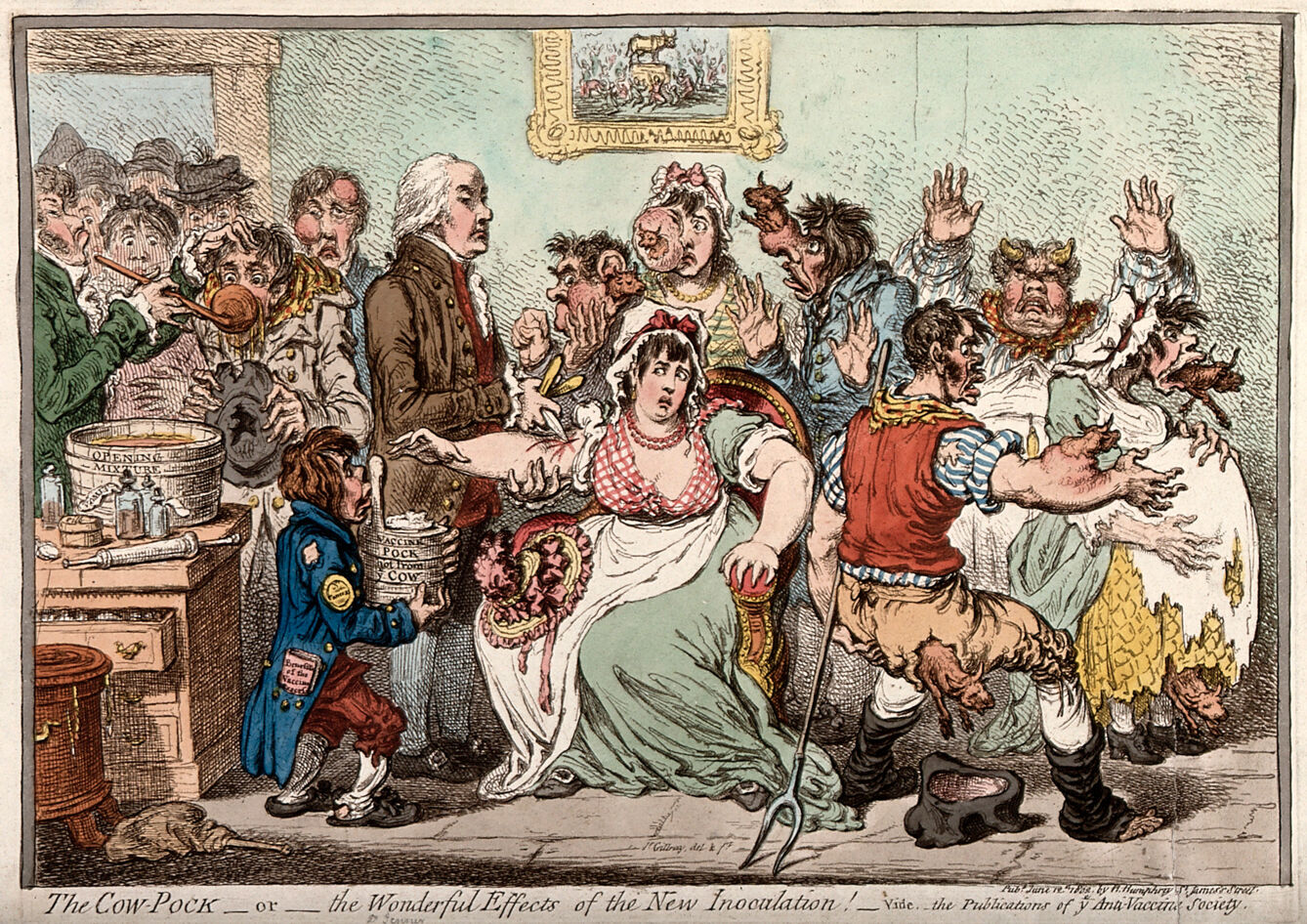
-
The Hospital Narratives: Telling Clinical Spaces in German and English Autopathographical Prose of the 20th and 21st Centuries (Baie)
The project explores the semantics of hospitals and their subspaces, such as patient rooms, operating theaters, and examination rooms, in German- and English-language autopathographical prose from the mid-twentieth century to the present. It aims to fill a significant gap in research in both literary spatial studies and cultural history: despite the spatial turn in literary and cultural studies and a growing scholarly interest in narratives of illness, there is no systematic study specifically dedicated to clinical settings as a central poetological feature in pathographical prose. Moreover, the project contributes to recent efforts in literary scholarship and the broader medical humanities to embrace multilingual, comparative approaches to the study of illness narratives.
The corpus comprises German- and English-language texts by eminent creative writers that draw on their respective experiences of hospitalization, among them Thomas Bernhard’s Der Atem (1978), Audre Lorde’s The Cancer Journals (1980), Hilary Mantel’s Giving Up the Ghost (2003) and David Wagner’s Leben (2013). Taking its cues from theories of autofiction and the emerging narratology of space, the project initially analyzes how hospital settings are narratively created and perspectivized in these texts. Consecutively, the study asks about the semantics of hospital settings by relating the narrative structures in the primary texts to the context of medical and hospital culture as conveyed in medical journals, architectural literature, and popular scientific writings.
The hypothesis is that clinical settings in autopathographical prose serve an important (cross-)cultural function in giving material form to reflections on issues as diverse as embodiment and identity, art, religion, political regimes, gender norms, medical authority, and (posthuman) care. In a period of increasing medicalization and rapidly evolving, progressively technologized hospital landscapes, literature thus emerges as an autonomous voice contributing to the broader cultural shaping and framing of clinical spaces across German and Anglophone contexts.
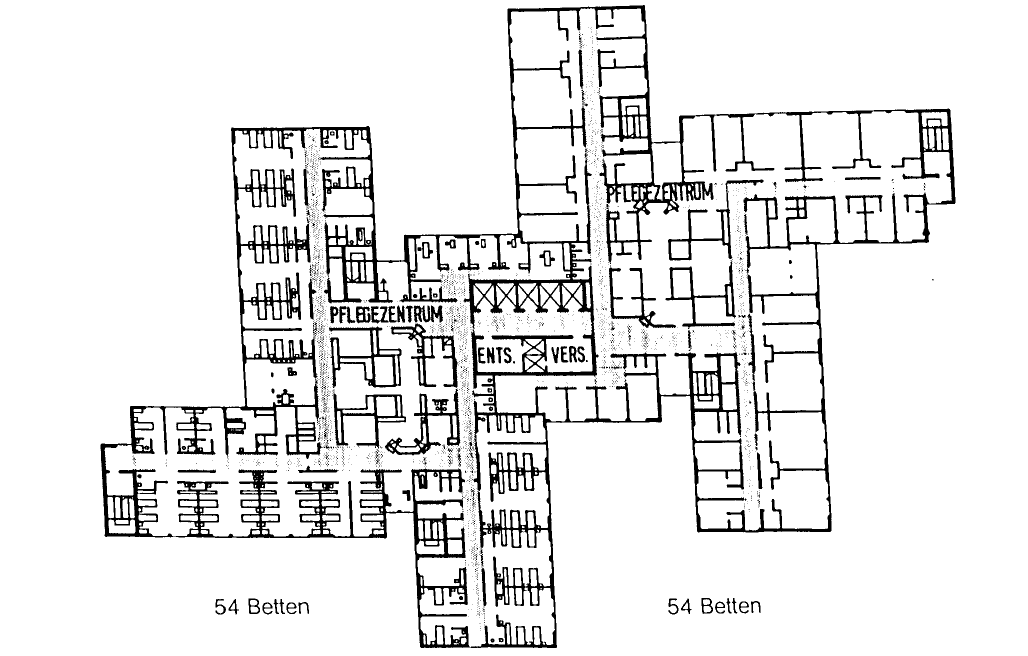
Floor plan of a surgical ward (Rudolf Virchow Hospital Berlin, 1980s), planning sketch by hospital architects Robert von Werz, Johann-Christoph Ottow, Erhard Bachmann and Michel Marx -
Fragile Modernity: approaching the Literature of the Weimar Republic through the perspectives of Medical Humanities and Disability Studies (Görbert)
This project concerns itself with the reasons, forms and consequences of the literary fascination with the subject of disability. Said fascination has given rise to a long list of impactful literary characters including Oedipus in Sophocles, Shakespeare’s Richard III, Victor Hugo’s’ Quasimodo, Melville’s’ Ahab and Max Frisch’s’ Theo Gantenbein.
Our methodology brings together perspectives from both Medical Humanities and Disability Studies. Specifically, we aim to question current dichotomies between the ‘medical’ views on the biology of individuals and the ‘social’ perspectives on disabilities. We aim to replace these dualistic models with a more integrative approach. Our goals in pursuing this project include contributing to the establishment of Medical Humanities and increasing the presence of Literary Disability Studies within German literary Studies.
Our primary historical focus are the texts of classical modernism, specifically those from the era of the Weimar Republic, a period which saw a significant increase in the literary and artistic presence of people with disabilities. This is in large part a consequence of the first world war; in its aftermath, the treatment of disabilities within society underwent extensive modernisation and professionalisation as it increasingly became the purview of dedicated institutions. However, it is also important to note how short-lived this visibility was. By 1933 at the latest, the rising tide of eugenics had comprehensively curtailed the societal participation of the disabled.
The authors we draw on for this project include Bertolt Brecht, Veza Canetti, Alfred Döblin, Lion Feuchtwanger, Leonhard Frank, Max Herrmann-Neiße, Franz Kafka, Thomas Mann, Joseph Roth, Ernst Toller and Stefan Zweig.
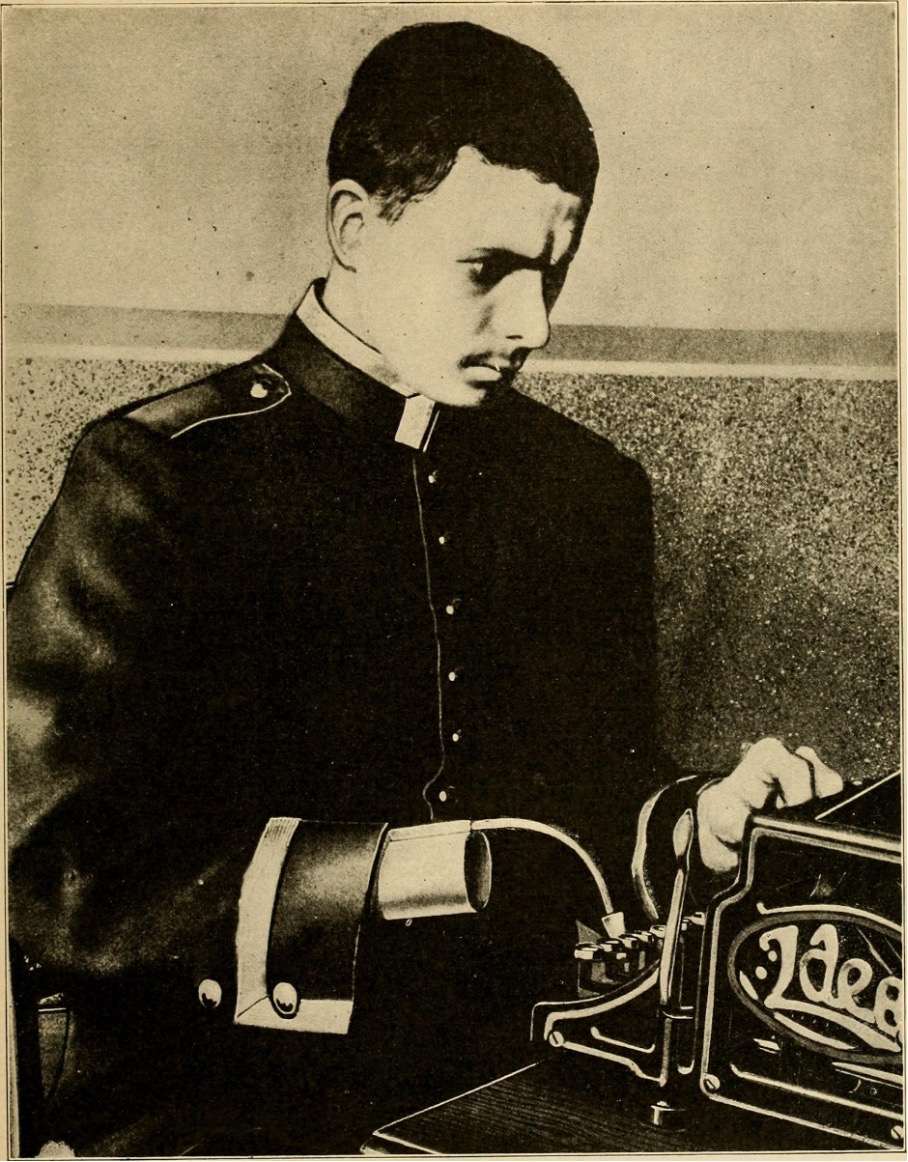
The People’s War Book[…]. Internet Archive Book Images, No restrictions, via Wikimedia Commons -
Raising a Well-Grown Child: Material and Media Cultures of Early Pediatrics (Rietmann)
During the 19th century, children moved into the focus of a blossoming material and media culture. A growing market of parent advice literature offered information on topics ranging from nutrition to moral education. An increasingly broad range of toys and educational devices, such as baby walkers and writing helps, sought to assist and discipline the child during learning. The nascent specialty of pediatrics was deeply embedded and participated in this culture. Medical practitioners wrote advice, developed medical tinctures, and patented devices for healthy growth and upbringing. The project investigates how these new material, media, and medical cultures of childhood produced ideas and discourses about health and illness, and normal and pathological development. It explores how childhood was discovered as a subject for health care in the public sphere and inquires into the cultural and medical meanings that have thus become attached to it.
-
Seeing the Infant: Media Technologies and the History of Child Psychiatry (Rietmann)
Seeing the Infant explores epistemic, social, and cultural dimensions of the use of audiovisual technologies in infant psychology and psychiatry in the USA and Western Europe from the mid-twentieth to the present. It investigates how scientific and medical practitioners employed cinematography, video, computational assessment methods, and digital interfaces to analyze the psychology of young children, diagnose normal and pathological development in infants, and treat relationship problems within families. The study engages with the increasing presence of old and new media in laboratories and clinics, and asks about both the limits these media pose and the opportunities they offer to science and medicine. Partly, it uses infant research as a case study of broader media-historical changes and sheds light on the historical backgrounds and potential implications of, by now, quotidian scientific and clinical tools. But the project is also an inquiry into a specific field of medical and scientific expertise. It investigates the emergence of the recent sub-specialty of infant mental health and not only explores how this multi-disciplinary field shaped and was shaped by audiovisual technologies but also how both the discipline and the technologies have contributed to the ways we conceptualize, treat, and educate families and children today.
-
The forgotten Avant-gardist Otto Nebel: dialogism, intermediality, multimediality (Kohler)
The aim of this project is to understand both inter- and multimediality through the work of artist and writer Otto Nebel. Despite being one of the most important contributors of classical modernism and the avant-garde movement in the first half of the 20th century, specifically within the ‘exiled avant-garde’, Nebel is not widely known. Of special interest to this project is his artistic dialogue with other avant-gardists, especially the equally enigmatic Kurt Schwitters. Through the famous magazine Der Sturm as well as in later visual, literary and musical pieces the two artists continuously referenced each other. This collective authorship gave rise to a sophisticated form of intertextuality and inter-and multimediality, which is the focus of our research.
Additionally, this project also includes the creation of a digital edition of Nebels’ work, which we hope can do justice to its many facets.
Typescript of Nebels poetry “Rüste-Wüste”, in: Otto Nebel Estate, Swiss Literary Archives, by kind permission of the Otto Nebel Foundation.
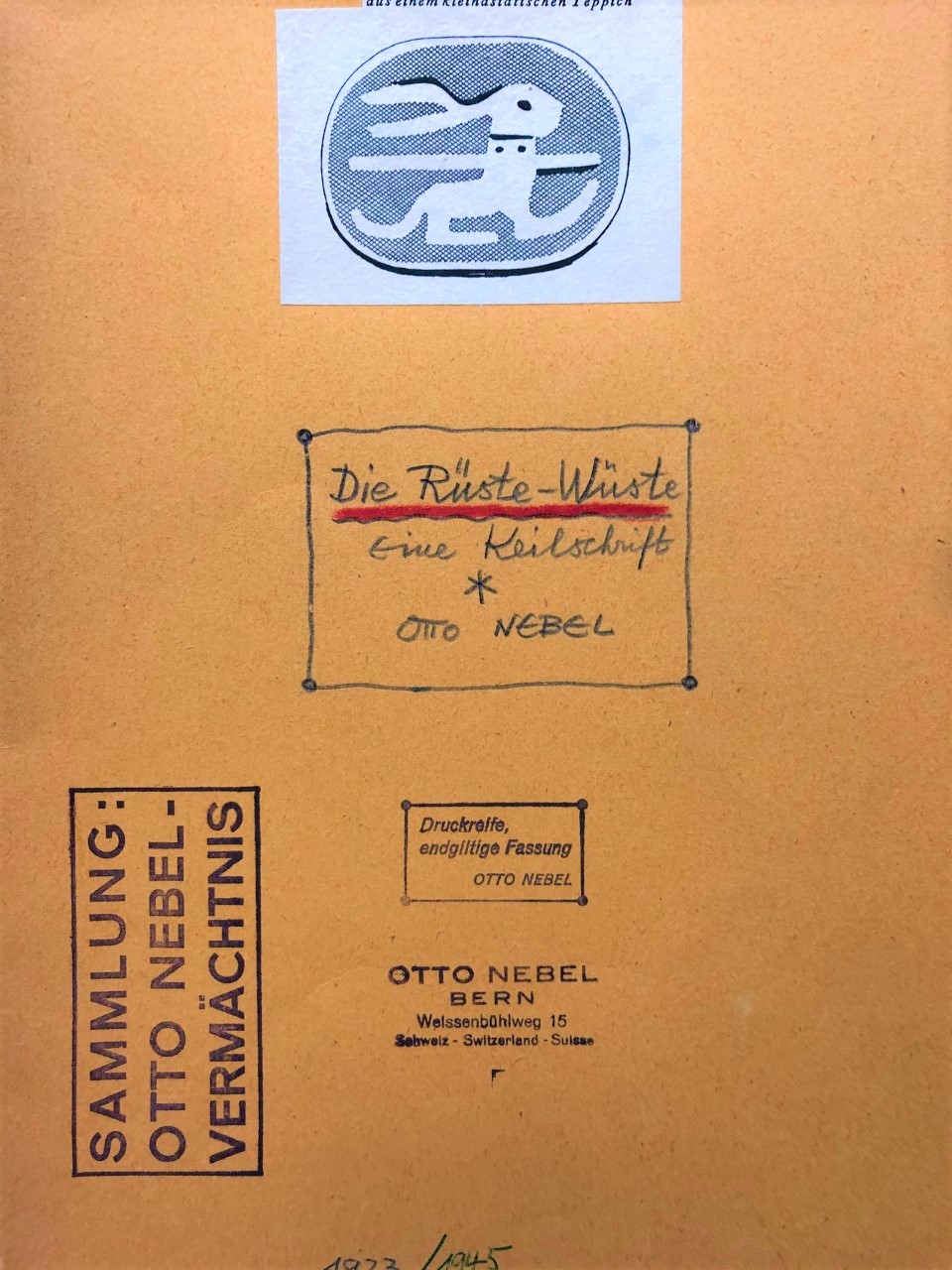
Typescript of Nebels poetry “Rüste-Wüste”, in: Otto Nebel Estate, Swiss Literary Archives, by kind permission of the Otto Nebel Foundation. -
The cultural and media history of infection, epidemics and vaccination (King)
The suffering and death of whole segments of society through infectious diseases has always fascinated and occupied the media. In doing so, it drove the development of modern journalism, brought about literary genres such as the novella and even the diversification and specialisation of modern media types. This fascination spans from the plague diaries of the early modern period and the epidemic-themed novellas of the 18 and 19thcentury over periodicals from the cholera era and Hollywood virus thrillers all the way to the daily outpouring of opinions about the Corona pandemic. The link between the history of epidemics, literary history and the development of modern media is accentuated especially during extraordinary events, such as pandemics or paradigm shifts in medicine. Two good examples of such events are the development of the first cowpox vaccination in the early 1800’s and Robert Kochs’ spectacular research at the end of the century. The effects of both phenomena extend well beyond the boundaries of medicine and into the cultural sphere; they become landmarks in the history of media, penetrating and affecting every aspect of the bourgeois societies in which they take place. Understanding the relationship between the concurrent histories of medicine, literature and media is the primary focus of this project. Martina Kings’ Habilitation about the cultural, literary and media history of bacteriology was published at De Gruyter in October 2021 under the title: “Microbes in modern literature, society and medicine: on the cultural history of an ephemeral object (1880-1930)”
Other Publications:
- Salvation and doom. On the literary and cultural history of vaccination in early 19thcentury. Kulturpoetik 2021/2, p. 176-209
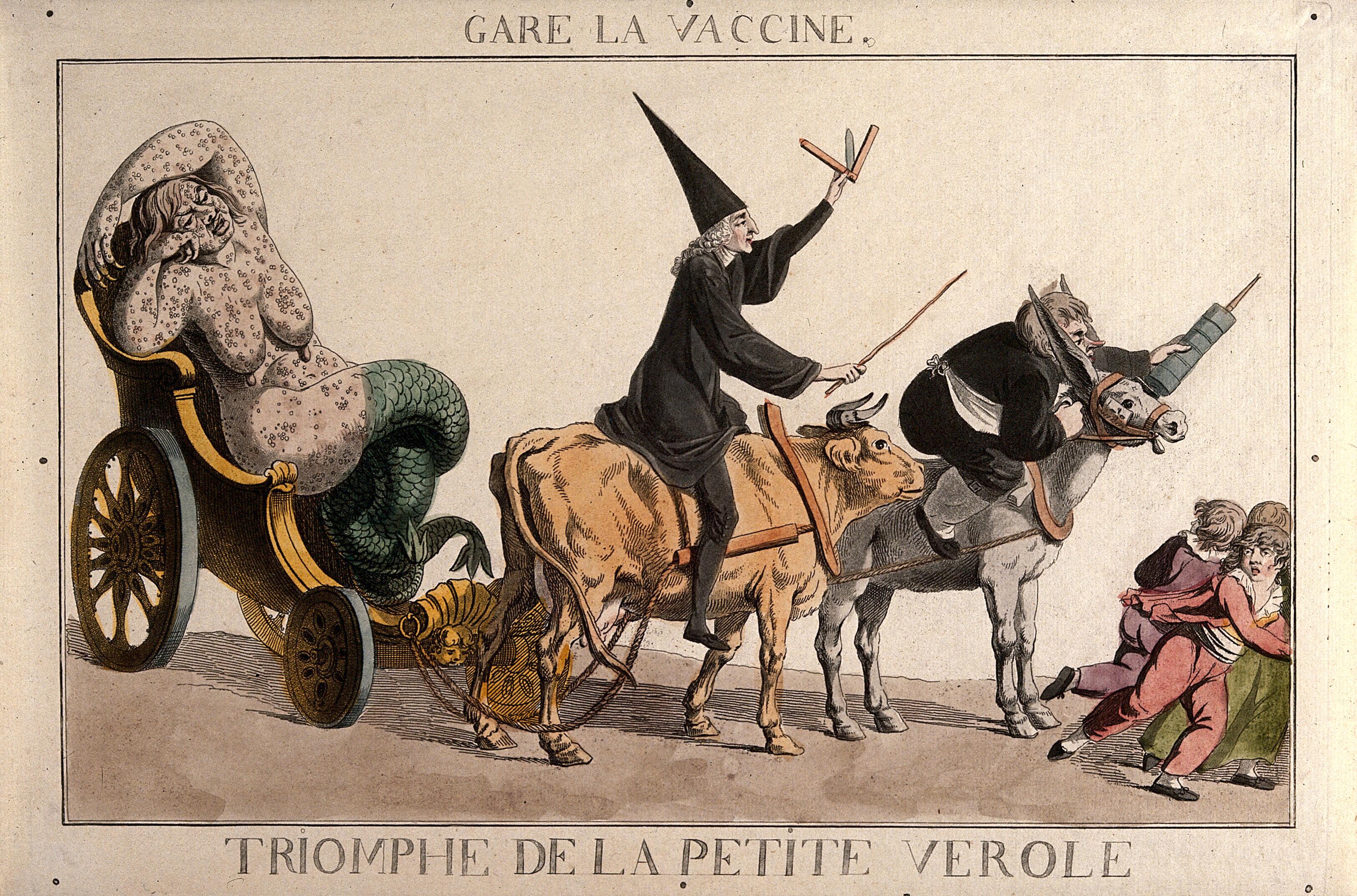
"Gare de la Vaccine"; coloured edging, France around 1810 -
Writing between art and world (Zeno jr. Bampi / Martina King)
On the politics and poetics of literature – the travel feuilletons of the ‘Young German’ literary movement; Zeno jr. Bampi (emergend from DFG/DACH-Project Epistemological Modernism. Empiricising nature and culture around 1830)
In the (terminated) first part of the project (Martina King), a fundamental shift in the system of knowledge was explored which occurred between 1820 and 1850. This ‘epistemological modernism’, as we conceived it, has a major impact on the processes of technical and cultural modernisation which were still to come. It is characterised by a new receptiveness towards reality in the sense of ‘pressure to experience’ (Erfahrungsdruck) and a ‘compulsion to empiricize’ (Empirisierungszwang), as they were termed by Wolf Lepenies. While this new wealth in experience is clearly the product of the development of scientific biology, its’ effects span many discourses beyond the purely scientific, notably occur in literary prose –and especially in that genre that scientists and creative writers have in common: the travel report. Travel writings of both scientists and authors of the ‘Young German literary movement’ – from Heine and Laube to Chamisso and Lyell – shift between narration and description, include pictures, numbers, statistics and intertexts and appear like montages or, in the words of Heinrich Heine, as “ein zusammengewürfeltes Lappenwerk” (a quickly thrown together rag). The aim of this first part of the project was to reveal the very modernist character of epistemological modernism – in that science and literature apparently no longer form a unity on the one hand; but that they become, on the other hand, newly intertwined in those artistic forms of representation.
Publications
- Martina King: Rock formations, whiskers, ladieswear: epistemology of comparing between nature and culture – around und after 1800, in: IASL 45/2 (Nov. 2020), S. 246-266
- 'Natural science in Lukka': empirical phenomena in travel narratives of Junges Deutschland, in: Philip Ajouri, Benjamin Specht (Eds.): The Empirization of the Transcendental. Conditions of Knowledge Science and Art 1850-1920, Göttingen: Wallstein 2019, S. 29-67
The second part of the project is the doctorate thesis of Zeno Bampi jr. Referring to selected examples of travel prose by Heine, Börne, Mundt, Gutzkow, Laube and Wienbarg, the project will determine the preconditions, philosophical foundations and aesthetic strategies of the ‘poetics of Young German writing’ – notably in a precision and depth that earlier scholarly attempts failed to achieve. In particular, it will be shown that the widely accepted but one-sided description of Young German travel prose as a politically engaged, worldly and proto-realistic type of literature falls short; it ignores remarkable traces of the idea of autonomous art and literature which was so characteristic for the classical era and which is absolutely crucial for the poetics of Young German writing – we have here another dimension of Heine’s famous ‘Lappenwerk’.
Image source: https://archive.org/stream/tagebuchvonhelgo00wienuoft#page/n7
Completed Research Projects
Daniela Kohler
From Deconstruction to Reconstruction: David Friedrich Strauß’s ambitions as a literary historian in the context of the birth of literary history in the 19th Century
(Habilitation in Neuerer deutscher und vergleichender Literaturwissenschaft, completed in January 2022)
Lea Anne Bühlmann
Self-Regulation and Feedback Loops- A Genealogy of Ecological Thinking
(Doctorate in History of Medicine, completed October 2021)
Yolanda von Wartburg
Medical Writing and Depersonalisation: Changing Medical Perceptions on Humanity in German Clinical Case Reports of the 20th Century.
(Postgraduate Thesis in History of Medicine, completed March 2021)
Lara Hegg
Menotoxin: History of an Ideologically explosive Scientific Discourse
(Postgraduate Thesis in History of Medicine, completed March 2022)
Jeremy Solioz
The Decline of the Scientific Hero Robert Koch : Influence of the International Mass Media on the Tuberculine Scandal between 1890 and 1891
(Postgraduate Thesis in History of Medicine, completed July 2022)
Jana Schafer
Darstellung von Behinderung in den literarischen Werken „Me Before You“ von Jojo Moyes und „The Revised Fundamentals of Caregiving“ von Jonathan Evison aus Sicht der Medical Humanities und der Disability Studies
(Postgraduate Thesis in Medical Humanities, completed August 2024)
Doing a doctorate in Medical Humanities
Learn more about the possibilities of postgraduate studies on the following website:studies.unifr.ch

